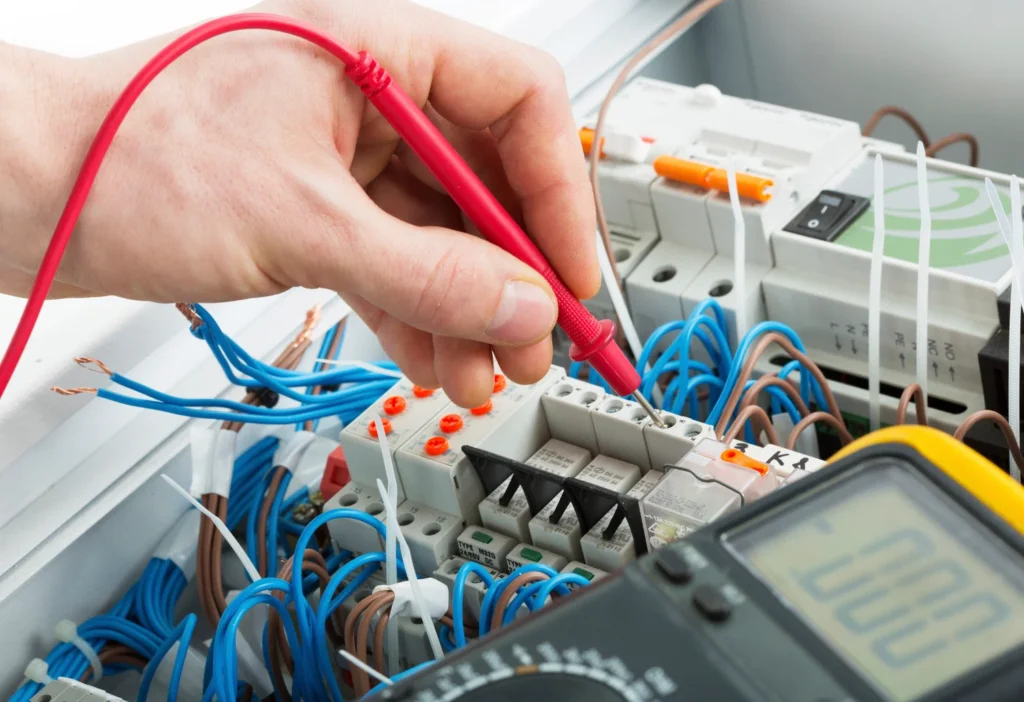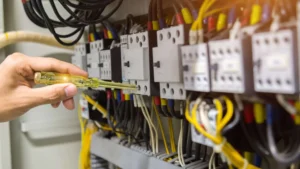
Electrical Inspections2
Table of Contents
-
What Are Electrical Inspections?
-
Why Electrical Inspections Are Important
-
When You Should Schedule an Electrical Inspection
-
What Happens During an Electrical Inspection?
-
How to Prepare for an Electrical Inspection
-
Choosing a Certified Electrical Inspector
-
How Long Does an Electrical Inspection Take?
-
Final Thoughts on Protecting Your Home with Electrical Inspections
-
FAQs
What Are Electrical Inspections?
An electrical inspection is a careful check of all the electrical systems and wiring in your home or building. A licensed electrician or electrical inspector performs these inspections to make sure everything is working properly and meets current safety standards.
During an inspection, they look at your outlets, wiring, breaker panels, lights, and sometimes even your appliances. They are searching for anything that could cause problems, such as fire hazards, shock risks, or code violations. Electrical inspections are important because they help keep homes safe, prevent accidents, and make sure your system is running the way it should.
Why Electrical Inspections Are Important
Electrical inspections are a key part of keeping your home and family safe. Over time, wires can become worn, outlets can become loose, and circuits can be overloaded. These problems can lead to dangerous situations like fires or electric shocks.
Getting an inspection catches these issues early, before they cause real harm. Inspections are not just about safety. They also help make sure your home meets local building codes. If you ever want to sell your home, having up-to-date electrical work can make the selling process much easier. Insurance companies may also require an inspection before giving you a homeowner’s policy, especially for older homes.
In simple terms, regular electrical inspections protect your property, your health, and your investment.
When You Should Schedule an Electrical Inspection
Many people are unsure when they need an electrical inspection. A good rule is to schedule one every few years, especially if your home is more than 20 years old.
You should definitely arrange for an inspection if you are buying a new home or selling your current home. It’s also smart to get an inspection after a major storm, flood, or other natural disaster that could have affected your electrical system.
Other signs you need an inspection include flickering lights, frequently tripped breakers, strange burning smells, or outlets that feel hot to the touch. If you are planning a big renovation or installing new heavy appliances, it’s a good idea to have an electrician check your system first to make sure it can handle the extra load.

What Happens During an Electrical Inspection?
When a licensed inspector arrives at your home, they follow a detailed checklist. They will look at your main electrical panel to make sure it’s labeled correctly, has no loose connections, and is properly grounded.
They will also test outlets to make sure they are delivering the right amount of power. Inspectors check light fixtures, ceiling fans, outdoor circuits, and sometimes even smoke detectors and carbon monoxide alarms.
If you have a pool, hot tub, or home generator, those will also be checked. The inspector is not just looking for problems; they are making sure everything meets the current electrical codes in your area.
After the inspection, you will get a report. If there are problems, the electrician will explain them and suggest repairs or upgrades. Sometimes the issues are small and easy to fix. Other times, especially in older homes, larger updates may be needed to stay safe and legal.
How to Prepare for an Electrical Inspection
Preparing for an electrical inspection is simple but important. Make sure the inspector can easily access your electrical panel, outlets, switches, and attic if necessary.
If you have pets, it’s a good idea to keep them secured during the inspection so the inspector can move around safely. Make a list of any electrical problems you’ve noticed, such as lights that dim or breakers that trip often. Share this information with the inspector at the start of the appointment.
If you have had any recent electrical work done, have the paperwork ready in case the inspector needs to see it. Being organized and ready can make the inspection faster and easier for everyone.
Choosing a Certified Electrical Inspector
It is very important to choose a qualified professional for your electrical inspection. Make sure the inspector is licensed and insured. This protects you if something goes wrong during the inspection.
Look for someone with good reviews and a strong reputation in your area. Many electricians also offer inspection services. Always ask how much experience they have, especially with the type of home you have—older houses can have special needs.
Get a written estimate for the cost of the inspection before work begins, and ask what is included in the inspection process. Working with a certified and trusted inspector means you will get honest advice and detailed information about your home’s safety.
How Long Does an Electrical Inspection Take?
The time it takes for an electrical inspection depends on the size of your home and how complex your electrical system is.
For a small home or apartment, the inspection might take about 1 to 2 hours. For a larger home with more circuits, multiple floors, or special features like pools or backup generators, the inspection can take 3 to 4 hours.
If the inspector finds a lot of issues, it might take even longer because they will need to check the system more carefully. In any case, it is time well spent to ensure your home is safe and your electrical system is working correctly.
Final Thoughts on Protecting Your Home with Electrical Inspections
Electrical inspections are one of the best ways to protect your home, your family, and your investment. Many problems with wiring or circuits are invisible to the untrained eye. You may not realize anything is wrong until something dangerous happens.
By scheduling regular inspections, you can catch problems early, fix them affordably, and keep your home in great shape. Whether you are buying a new home, selling your old one, or just want peace of mind, a professional electrical inspection is a smart move.
Remember to choose a licensed inspector you trust, and don’t wait until there’s a serious problem to have your home checked. Safety should always come first.
Read more article https://articlefun.com/




